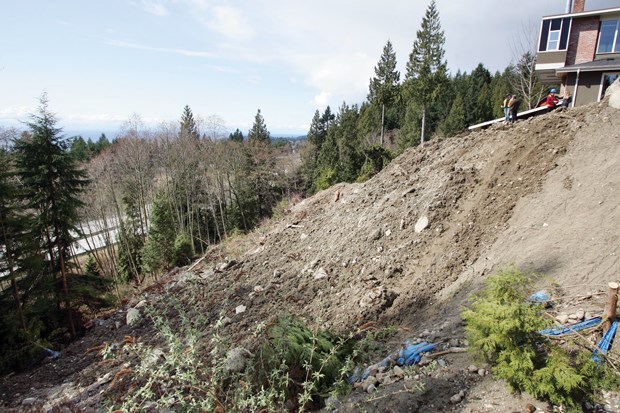A West Vancouver couple who were handed a fine of $100,000 for causing a landslide to run into a fish-bearing creek in 2013 have had an appeal of their case dismissed by a B.C. Supreme Court justice.
In a decision March 13, B.C. Supreme Court Justice Barbara Young upheld the original convictions and sentencing in the case, rejecting all grounds of the appeal.
In February 2016, North Vancouver provincial court Judge Bryce Dyer fined West Vancouver property owners Mohammadreza Morshedian $60,000 and his wife Seyedeh Shahrbanoo Janani $40,000 for repeatedly violating several municipal bylaws when they began landscaping work on their British Properties lot without permits or a sediment control plan between January and March of 2013.
The work included dumping truckloads of fill from another site in West Vancouver on to their property at 2785 Chelsea Close without proper approvals, and despite a stop work order.
The District of West Vancouver took the couple to court to prove the illegal landscaping caused a landslide that sent sediment into a tributary of Rodgers Creek on March 21, 2013.
The couple appealed both the convictions and the sentences to the B.C. Supreme Court. They argued that the municipality’s soil deposit and removal bylaw was vague and unenforceable, that the North Vancouver trial judge had made an error in interpretation of the district’s watercourse bylaw and that there was no proof beyond a reasonable doubt that any soil from their property had entered the creek. They also argued that the judge should not have imposed such heavy fines on both husband and wife and that the fines constituted cruel and unusual punishment, a violation of their charter rights.
But the B.C. Supreme Court justice rejected those arguments.
In the appeal, the couple argued that although they didn’t get a permit for the work, they thought they were exempt because theirs was a small project. They also argued they had performed due diligence by going to the municipal office and asking if permits were needed.
But Young ruled the amount of soil dumped on the property exceeded what was allowed under an exemption. She also wrote there was ample evidence during the trial that Morshedian did not accurately describe the work being done. “. . . it is clear that he did not disclose that he intended to dump a large amount of soil onto his property,” wrote Young in rejecting that argument.
Similarly, the justice dismissed the idea that Janani was not responsible for what happened on the property.
“She is not an innocent party,” she wrote, adding Janani had permitted the work on the property that she owned.
The decision demonstrates the importance of upholding laws that safeguard the environment, according to Maegen Giltrow, the lawyer who represented the District of West Vancouver.
“If (the laws are) broken, the fines have to reflect more than the cost of doing business,” she said. “The hope (is) that this will be seen by other property owners and the importance of obeying these laws will be heeded.”
The court recognized the district has a regulatory apparatus in place to prevent this type of situation, noted Giltrow.
“In this case it had been avoided altogether by the property owner,” she said.
While the homeowner sought advice from district staff, they failed to be “absolutely honest, transparent and thorough” in their description of the work they were planning to undertake, she said.
During the original trial, the judge heard the Chelsea Close property was one of four the professional couple owned in West Vancouver at the time, and was rented as an investment property.
The justice also rejected a request to lower their combined fine from $100,000 down to $10,000.
The municipality previously indicated it intends to go after the couple to collect the approximately $75,000 cost of cleaning up the creek and remediating the landslide after it occurred.
The case could be appealed to the B.C. Court of Appeal.



